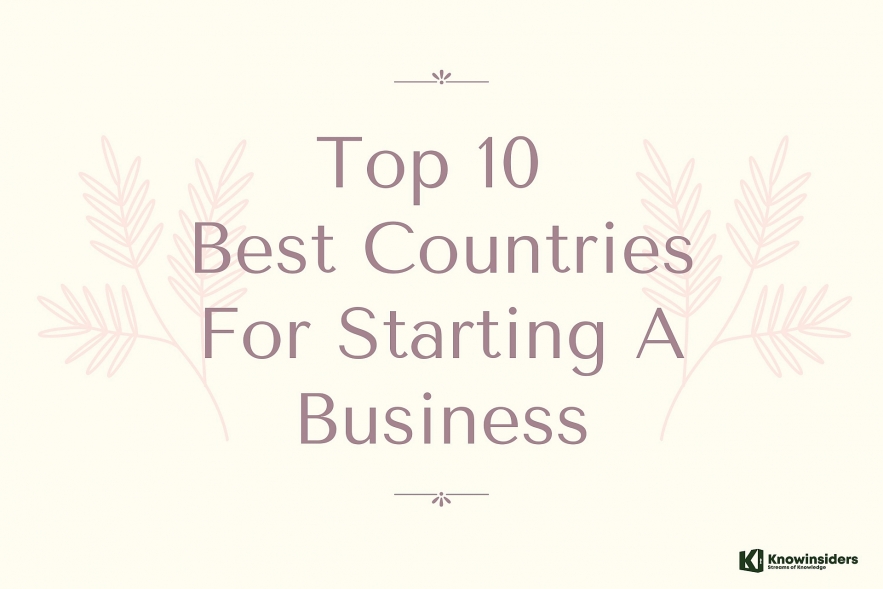Top 10 Best Countries For Starting A Business In The World
 |
| Top 10 Best Countries For Starting A Business In The World. Photo KnowInsiders |
A new international survey by UK-based Small Business Prices provides some “big picture” guidance on this fundamental issue, but should not be considered the last word on the subject. Their list of best countries for start-up businesses is not related to and should not be confused with any lists from Forbes or other news organizations or websites.
The list from Small Business Prices is based on several metrics including the number of new businesses in 43 countries, the type of industries they are in, business survival rates and gross domestic spending on research and development.
List of Top 10 Best Countries For Starting A Business In The World
(According to UK-based Small Business Prices)
1.United States
2.United Kingdom
3.Australia
4.France
5.Chile
6.Italy
7.Spain
8.Turkey
9.Mexico
10.Germany
*****
Top 10 Best Countries For Start-ups
1.United States
The USA is sometimes referred to as the “land of opportunity” and for good reason. With a strong economy, a skilled and enthusiastic workforce, and many more advantages, companies like yours will prosper if you’re able to step beyond your comfort zone and grow to the US market. Exploring the USA may mean that your company has the chance to tap into a healthy, profitable economy as one of the largest markets in the world. At the moment, it is also the largest importer of British products, and it is also the world’s number one destination for luxury goods.
Exploring the USA and succeeding in venture could help to enhance your business’ prestige, enhance its reputation, and even provide new opportunities for investment and growth. Eventually, while there’s exceptional potential all over the world, the US appears to have a high concentration of its own. Take the technology and software developers, for example, areas such as Silicon Valley are home to half of all companies in the Fortune 100, meaning that international businesses that really want to tap into the expertise, creativity, and skills and some of the brightest minds and most energetic entrepreneurs should consider exploring this field.
2.United Kingdom
The United Kingdom has an enviable startup ecosystem, attracting talented entrepreneurs from across Europe and beyond, and building world-class businesses like Revolut, Wise and Graphcore. London is the centre of the UK’s high-growth economy. Home to 11.8k ambitious companies and attracting £6.79b of venture capital investment in 2020 alone, the European capital of fintech is giving Silicon Valley a run for its money. But outside the Capital, there are plenty of smaller cities building their own leading tech hubs.
UK startups have lower expected costs of doing business than many other European countries— declining corporate tax rates and lower salary expectations are a clear benefit to startups in the UK. Small businesses with greater hiring needs will find this particularly helpful. In fact, the UK ranked #3 for Costs of Doing Business behind the Czech Republic and Estonia.
3.Australia
 |
| Photo US Chamber of Commerce |
Pros for how Australia is a good place for a startup:
Australia has incorporated crowdfunding laws in its system, allowing non-listed startups to raise the capital from public. This is a simple and faster way of raising funds for your business. A friend, family, individual investor or general public can invest in your idea if they like it. This method is also likely to fetch you potential customers and a quick pilot of your business idea.
Australia’s is currently ranking on 5th position on Index of Economic Freedom, 2018. This index basically tells you how much the government is involved in or interfere in country’s general operations. Australia comes under the category ‘free’. Less government interference.
| Australia hasn’t seen recession in over past 2 decades. Its economy is very stable. Last thing you need for any new business is change in economic cycle while you are in your setting up stage. Forbes has listed Australia on 11th position in the list of world’s best place to do business. |
4.France
 |
| Photo The Northern Club |
Best cities for tech startups in France
Paris
Where else could we start? Paris is one of the most desirable destinations in the world, combining incredible history and culture with exclusive shopping districts and gorgeous eateries. It’s a testament to how incredible Paris is that it’s both the most visited city in the world, and one of the best places to live. Its sprawl of arrondissements offer something for everyone, and no location is without its charms.
Lyon
France’s second largest and second richest metropolitan area is all things to all people. A historic capital, industrial centre and food mecca, Lyon has increasingly developed a reputation for cutting-edge businesses. As well as being a longstanding centre of finance, Lyon has become renowned for its tech startups, with specialities including chemical and pharmaceutical production, biotech research, and a burgeoning software industry.
Nice
Nice by name, nice by nature. Nice (that’s pronounced ‘niece’) has been one of France’s most desirable cities since the 18th century, when it became a favourite retreat of the English aristocracy. The scenery and natural lighting have made it a home and haven for artists down the centuries, with works by Matisse and Chagall littering Nice’s many museums and galleries.
5.Chile
In 2010, the Chilean government, through its development agency CORFO (Corporación de Fomento de la Producción de Chile), created a program called StartUp Chile (SUP), which aims to change its culture towards the entrepreneurial mindset, positioning the country as a hub for innovation in Latin America. StartUp Chile was the first governmental accelerator of its kind, supporting over 1,600 startups, with more than 4,500 entrepreneurs from 85 countries.
Since StartUp Chile was launched, 54.5% of the startups accelerated by the program are active today. Together they have raised over 998 million USD, 13.8 times the original investment made by CORFO. Chile’s program has been inspiring over 50 public accelerators worldwide, such as Startup Peru (Peru), Startup Brasil (Brazil), Ruta N (Colombia), K-Startup Grand Challenge (South Korea), among others.
6.Italy
Italy is a big economic power in Europe and an enticing investment economy. Known for its architecture, food, and rich heritage, Italy also offers well-established R&D, engineering, and design infrastructure and a large manufacturing base. Italy’s geographical position is important, rendering it a strategic logistics center and a gateway to the single European market. Located in the center of the Mediterranean Sea, Italy is a geographic conduit for customers throughout the European Union, Northern Africa, and the Middle East. It is also the main hub connecting southern, central, and eastern Europe.
Italy is one of the biggest producing countries in Europe, second only to Germany. Products manufactured in Italy continue to enjoy a reputation for good quality and design. Investors may aim to partner with a wide pool of experts in a variety of sectors such as machine tools, fashion goods, food products, automotive, and pharmaceuticals. Companies may also reach a large network of intermediary manufacturers in a wide variety of sectors, including industrial equipment, metals, chemicals, plastics, paper, ceramics, textiles, and marine industries, among others. Italy is one of only five nations with an export surplus.
7.Spain
Beyond its history, fantastic weather, tasty food, and enjoyable lifestyle, Spain is home to a rising start-up scene that is helping to rejuvenate and renew the country in more ways than one. Aspiring entrepreneurs should take care of the fact that Madrid has the potential to become a global center for creativity, writes local investment partner Marte Martin. Spain is not a company-focused country committed to drawing lucrative international attention. It’s far from easy and quick when dealing with company regulations. The Spanish Government passed a bill to help domestic companies draw international expertise and investment. This included a group of visas for foreign entrepreneurs, forcing them to have nothing more than a business plan and enough money to support themselves whilst living here.
While Spain has only a few public financing programs, access to accelerators and investors has increased significantly. Governments are pushing forward with new policies and regulations to make processes simpler for start-ups in Spain. Recently, for example, Spain’s Prime Minister has put out a series of new proposals to encourage creativity and entrepreneurship.
8.Turkey
Turkey has managed to place itself among Europe's Top 10 countries in regards to the inflow of angel and venture capital investments from January through March, according to data compiled by startup monitor, startups.watch.
In the Middle East and North African region, the country ranked second only to Israel.
What’s more, the rise of Istanbul also continued as the metropolis ranked seventh among the European cities that received the most investment in the first quarter of 2021, the da In the ranking made by startups.watch by cities, Istanbul maintained its leadership. Forty-nine of the 62 investments made in the first quarter of 2021 were made in ventures based in the metropolis.
| After the successful sales deals of Peak and Rollic in 2020, the dynamism in the gaming industry has continued. From January through March, 15 gaming ventures broke records after receiving an investment worth around $60 million. Dream Games, which ranked second after Getir in the first quarter, received the largest investment in a single round with $50 million. |
9.Mexico
5 ‘most promising startups’ in Mexico in 2021
Below, the 10 companies that made the list are highlighted, with six of them offering fintech in Mexico, or otherwise involved in providing finance-related services.
1. Kavak
Kavak is a platform focused on online purchases and sales of automobiles, which recently made waves after raising $700 million in funding to become one of the most highly valued startups in Latin America. Founded in 2016 and based in Mexico City, the company had 4,300 full-time staff at the time of closing the study — before that recent injection of funds.
The company currently has a presence in Argentina and Brazil, as well as its home country, and intends to use the new funds to continue with expansion in the region, and later elsewhere globally.
2. Jüsto
Only formed in 2019, Jüsto is an online supermarket that managed to raise $100 million in investment in 2021 to expand its presence in its home country of Mexico, where it has more than 1,000 full-time staff.
Jüsto aims to be the most popular online supermarket in Latin America by 2030, and recently expanded into Brazil with a $40 million investment that saw 300 local staff hired.
3. Bitso
Cryptocurrency exchange Bitso was established in 2014 and by the time the study closed had 430 full-time staff. In 2021, the Mexico City based startup raised $250 million in funding and reached a value of $2.2 billion.
The company recently announced that it had seen a million new users open accounts, to hit a total of three million accounts. The crypto company will also be supporting El Salvador’s Chivo wallet, after the Central American country recently became the first country in the world to make the cryptocurrency Bitcoin legal tender.
4. Credijusto
Also established in 2014, Credijusto is a fintech in Mexico that provides financial solutions and credit to companies. In 2021, the startup launched an entirely online “alternative credit” solution in conjunction with American Express, with the stated aim of providing entrepreneurs with greater control and visibility over their companies’ expenses.
The company recently became the first Mexico fintech to purchase a bank, with the acquisition of Finterra, which saw Credijusto announce its intention to move increasingly into more traditional banking activities, as well as to provide support to small- and medium-sized enterprises (SMEs) in the agricultural sector.
5. Minu
Since being established in 2019, Minu has struck agreements with more than 100 companies to allow their employees to access the on-demand salaries that it offers. The product comes with no commission or interest charges, and sees users of the mobile app able to withdraw cash for a fee similar to a normal ATM withdrawal fee.
10.Germany
Huge purchasing capacity, a creative environment, its position at the center of a dense transit network in central Europe, and highly skilled staff – all of these are advantages provided by Germany as a business location.
Science and practical-oriented research and well-trained technical experts have built an outstanding climate for creativity. You should foresee a healthy political and economic climate for your ideas as an entrepreneur in Germany. And what’s more, your proposals are covered by the statute. Inventions, business logos, and concepts: In Germany, intellectual property is secured. Germany not only defends the freedom of competition, but also the freedom of its citizens. The basis for this is the liberal democratic basic order, which specifies that the citizens of Germany elect their leaders, and the division of powers prohibits misuse of authority.
Both German states provide specialist knowledge centers for businesses – and advice is free of charge. There is also a large choice of start-up projects. They will help you identify the best networks and help you with issues relating to financing and others. Government assistance services can also provide financing.
 What Are The Differences Between B2B and B2C? What Are The Differences Between B2B and B2C? With the striking development of eCommerce, many companies have been modifying to adopt both B2B and B2C. So what are the differences between them? |
 How To Get A Small Business Loan: Best Tips for Startup Success How To Get A Small Business Loan: Best Tips for Startup Success Money is important if you want to start your business, which small business loan will help with that. To better understand what it is and ... |

























